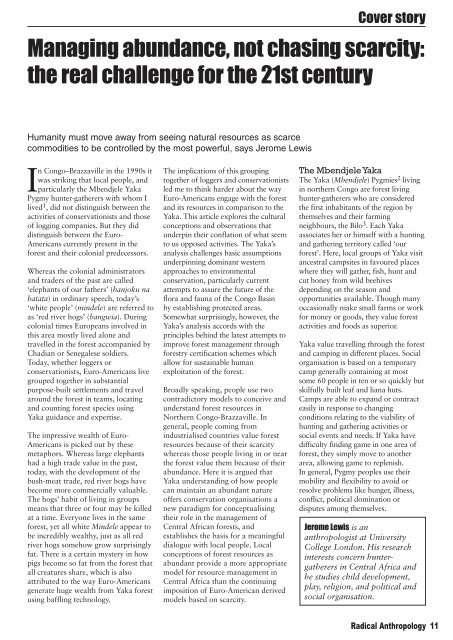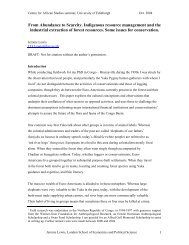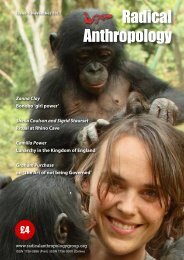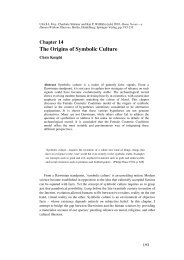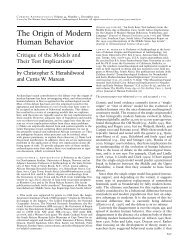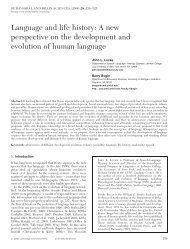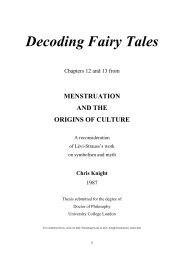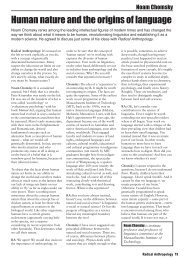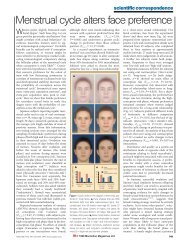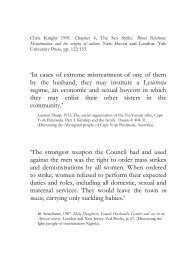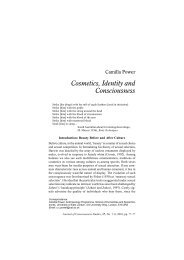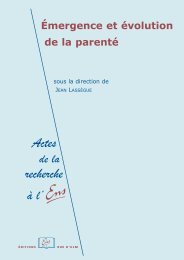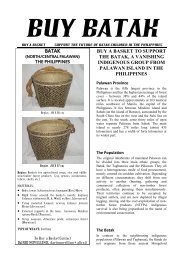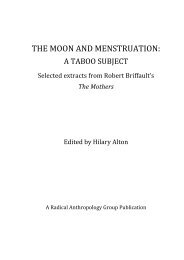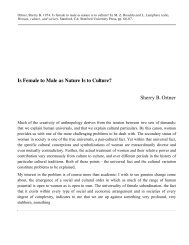The scarcity myth The scarcity myth - Radical Anthropology Group
The scarcity myth The scarcity myth - Radical Anthropology Group
The scarcity myth The scarcity myth - Radical Anthropology Group
Create successful ePaper yourself
Turn your PDF publications into a flip-book with our unique Google optimized e-Paper software.
Cover story<br />
Managing abundance, not chasing <strong>scarcity</strong>:<br />
the real challenge for the 21st century<br />
Humanity must move away from seeing natural resources as scarce<br />
commodities to be controlled by the most powerful, says Jerome Lewis<br />
In Congo–Brazzaville in the 1990s it<br />
was striking that local people, and<br />
particularly the Mbendjele Yaka<br />
Pygmy hunter-gatherers with whom I<br />
lived 1 , did not distinguish between the<br />
activities of conservationists and those<br />
of logging companies. But they did<br />
distinguish between the Euro-<br />
Americans currently present in the<br />
forest and their colonial predecessors.<br />
Whereas the colonial administrators<br />
and traders of the past are called<br />
‘elephants of our fathers’ (banjoku na<br />
batata) in ordinary speech, today’s<br />
‘white people’ (mindele) are referred to<br />
as ‘red river hogs’ (bangwia). During<br />
colonial times Europeans involved in<br />
this area mostly lived alone and<br />
travelled in the forest accompanied by<br />
Chadian or Senegalese soldiers.<br />
Today, whether loggers or<br />
conservationists, Euro-Americans live<br />
grouped together in substantial<br />
purpose-built settlements and travel<br />
around the forest in teams, locating<br />
and counting forest species using<br />
Yaka guidance and expertise.<br />
<strong>The</strong> impressive wealth of Euro-<br />
Americans is picked out by these<br />
metaphors. Whereas large elephants<br />
had a high trade value in the past,<br />
today, with the development of the<br />
bush-meat trade, red river hogs have<br />
become more commercially valuable.<br />
<strong>The</strong> hogs’ habit of living in groups<br />
means that three or four may be killed<br />
at a time. Everyone lives in the same<br />
forest, yet all white Mindele appear to<br />
be incredibly wealthy, just as all red<br />
river hogs somehow grow surprisingly<br />
fat. <strong>The</strong>re is a certain mystery in how<br />
pigs become so fat from the forest that<br />
all creatures share, which is also<br />
attributed to the way Euro-Americans<br />
generate huge wealth from Yaka forest<br />
using baffling technology.<br />
<strong>The</strong> implications of this grouping<br />
together of loggers and conservationists<br />
led me to think harder about the way<br />
Euro-Americans engage with the forest<br />
and its resources in comparison to the<br />
Yaka. This article explores the cultural<br />
conceptions and observations that<br />
underpin their conflation of what seem<br />
to us opposed activities. <strong>The</strong> Yaka’s<br />
analysis challenges basic assumptions<br />
underpinning dominant western<br />
approaches to environmental<br />
conservation, particularly current<br />
attempts to assure the future of the<br />
flora and fauna of the Congo Basin<br />
by establishing protected areas.<br />
Somewhat surprisingly, however, the<br />
Yaka’s analysis accords with the<br />
principles behind the latest attempts to<br />
improve forest management through<br />
forestry certification schemes which<br />
allow for sustainable human<br />
exploitation of the forest.<br />
Broadly speaking, people use two<br />
contradictory models to conceive and<br />
understand forest resources in<br />
Northern Congo-Brazzaville. In<br />
general, people coming from<br />
industrialised countries value forest<br />
resources because of their <strong>scarcity</strong><br />
whereas those people living in or near<br />
the forest value them because of their<br />
abundance. Here it is argued that<br />
Yaka understanding of how people<br />
can maintain an abundant nature<br />
offers conservation organisations a<br />
new paradigm for conceptualising<br />
their role in the management of<br />
Central African forests, and<br />
establishes the basis for a meaningful<br />
dialogue with local people. Local<br />
conceptions of forest resources as<br />
abundant provide a more appropriate<br />
model for resource management in<br />
Central Africa than the continuing<br />
imposition of Euro-American derived<br />
models based on <strong>scarcity</strong>.<br />
<strong>The</strong> MbendjeleYaka<br />
<strong>The</strong> Yaka (Mbendjele) Pygmies 2 living<br />
in northern Congo are forest living<br />
hunter-gatherers who are considered<br />
the first inhabitants of the region by<br />
themselves and their farming<br />
neighbours, the Bilo 3 . Each Yaka<br />
associates her or himself with a hunting<br />
and gathering territory called ‘our<br />
forest’. Here, local groups of Yaka visit<br />
ancestral campsites in favoured places<br />
where they will gather, fish, hunt and<br />
cut honey from wild beehives<br />
depending on the season and<br />
opportunities available. Though many<br />
occasionally make small farms or work<br />
for money or goods, they value forest<br />
activities and foods as superior.<br />
Yaka value travelling through the forest<br />
and camping in different places. Social<br />
organisation is based on a temporary<br />
camp generally containing at most<br />
some 60 people in ten or so quickly but<br />
skilfully built leaf and liana huts.<br />
Camps are able to expand or contract<br />
easily in response to changing<br />
conditions relating to the viability of<br />
hunting and gathering activities or<br />
social events and needs. If Yaka have<br />
difficulty finding game in one area of<br />
forest, they simply move to another<br />
area, allowing game to replenish.<br />
In general, Pygmy peoples use their<br />
mobility and flexibility to avoid or<br />
resolve problems like hunger, illness,<br />
conflict, political domination or<br />
disputes among themselves.<br />
Jerome Lewis is an<br />
anthropologist at University<br />
College London. His research<br />
interests concern huntergatherers<br />
in Central Africa and<br />
he studies child development,<br />
play, religion, and political and<br />
social organisation.<br />
<strong>Radical</strong> <strong>Anthropology</strong> 11


